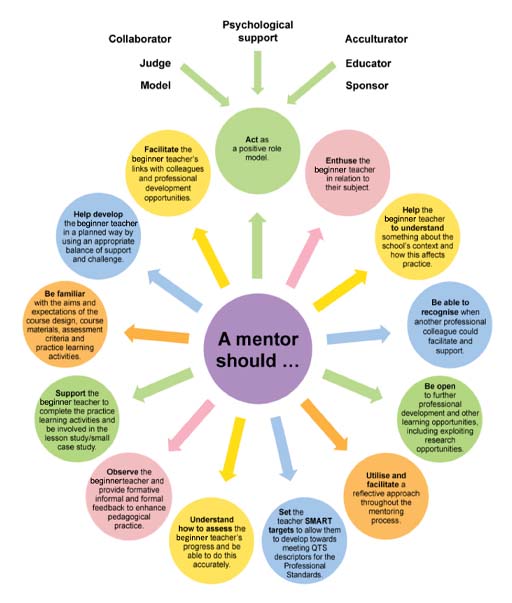1.2 Effective mentoring
Hobson and Malderez (2013) define mentoring as:
The one to one support of a novice or less experienced practitioner (mentee) by a more experienced practitioner (mentor), designed primarily to assist the development of the mentee’s expertise and to facilitate their induction into the culture of the profession [teaching] and into the specific local context [school].
This definition makes clear that one of the primary roles mentors play is both acculturator and sponsor (Hobson and Malderez, 2013). Mentors support beginner teachers to move progressively into the community of practice of the school by helping them to learn the practices and expectations of teaching and of the school context.
Mentors also work in a developmental capacity. Close support is offered initially and then, as the beginner teachers’ skills, knowledge and understanding increase and they become both more proficient and confident, the emphasis shifts to empowering and enabling (Clutterbuck, 2004). The mentor’s role is to support the beginner teacher along this continuum as they move towards autonomy.
Mentoring is also about bridging the beginner teacher’s school and university or academic experiences – taking a wider interest in your mentee’s academic work will also help provide holistic support. The effective mentor works to shape the beginner teachers’ understanding of the interrelationship between learning from research, theory and experience and how the context itself affects learning (Mutton, Hagger and Burn, 2011). Here the mentor is educator, collaborator and model.
Lastly, mentors also need to provide emotional support for beginner teachers in order to ensure their wellbeing. This role can often be under-emphasised by mentors who may place more significant focus on practical issues such as classroom management or subject knowledge.
The variety of roles that effective mentors need to play are summarised in Figure 2 [Tip: hold Ctrl and click a link to open it in a new tab. (Hide tip)] (to view a larger pdf version: open this link in a new tab or window by holding down Ctrl, or Cmd on a Mac, when you click)
The next activity will help you consider your own mentoring skills and identify where your strengths may be.
Activity 2 Reflecting on and auditing mentoring skills
Reflect on the different elements of a mentor’s role as set out in Figure 2. Consider what you do (or can do) to help you accomplish this aspect of mentoring. Reflect on your personal areas of strength and where you need to develop your skills using the table below. Rate your proficency from 1 to 5.
| Mentor skills | How do I achieve this? | 1 (Not very strong) |
2 | 3 | 4 | 5 (Very strong) |
| I can act as a positive role model. | ||||||
| I am able to enthuse a beginner teacher in relation to the content to be taught. | ||||||
| I can help beginner teachers to understand the school context and how this affects practice. | ||||||
| I recognise when I need to draw on the expertise of other colleagues to support the beginner teacher’s needs. | ||||||
| I am open to professional learning opportunities, including exploring research. | ||||||
| Through my mentoring, I am able to develop my beginner teacher’s quality and depth of reflection. | ||||||
| I set SMART targets to support my beginner teacher to progress and to meet professional standards. | ||||||
| I understand how to assess my beginner teacher’s progress effectively and accurately. | ||||||
| I use observation of my beginner teacher’s practice to provide helpful feedback to enhance their pedagogical learning. | ||||||
| I facilitate a range of development experiences across the school to support my beginner teacher’s practice needs. | ||||||
| I am familiar with my beginner teacher’s ITE or induction programme design, requirements and assessment methods. | ||||||
| I plan specific opportunities and methods to provide support and challenge for my beginner teacher. |
You can use your audit findings to reflect on your strengths and areas for development. You may also wish to consider setting yourself some targets to realise as you complete the course. In Week 4, you will return to this activity to consider your progress.

